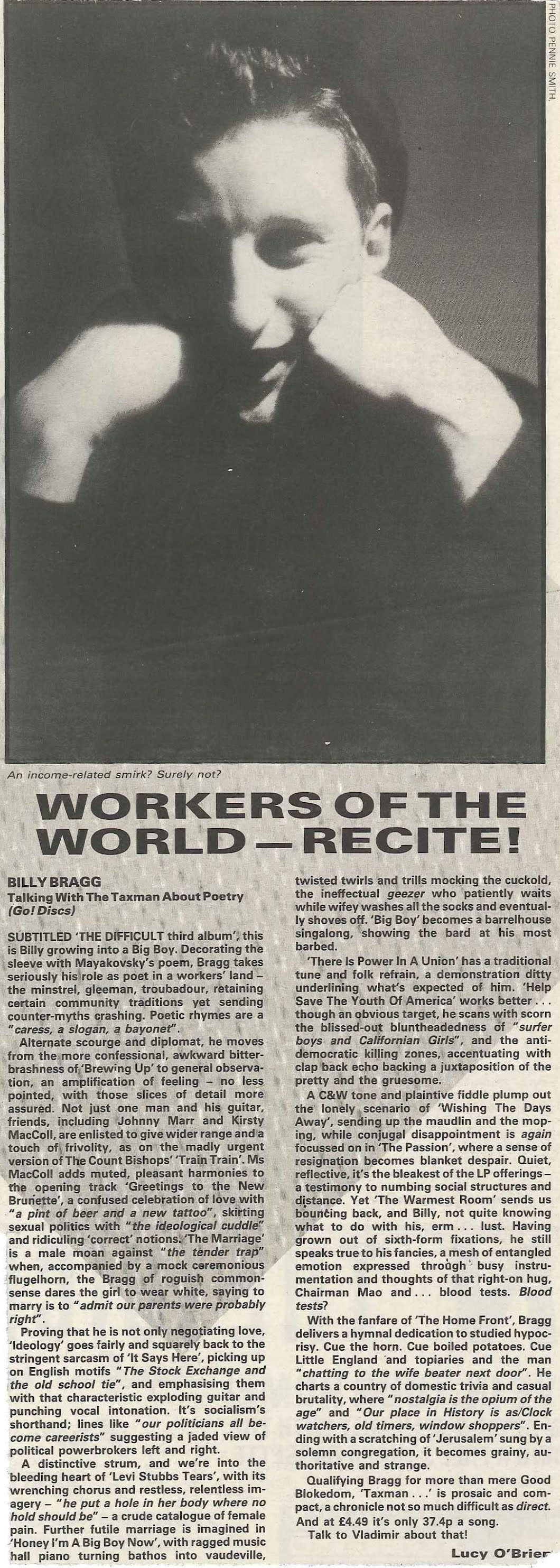Billy Bragg "Talking With the Taxman About Poetry" Review
WORKERS OF THE WORLD - RECITE!
BILLY BRAGG
Talking With The Taxman About Poetry
(Go! Discs)SUBTITLED 'THE DIFFICULT third album', this is Billy growing into a Big Boy. Decorating the sleeve with Mayakovsky's poem, Bragg takes seriously his role as poet in a workers' land - the minstrel, gleeman, troubadour, retaining certain community traditions yet sending counter-myths crashing. Poetic rhymes are a "caress, a slogan, a bayonet".
Alternate scourge and diplomat, he moves from the more confessional, awkward bitterbrashness of 'Brewing Up' to general observation, an amplification of feeling - no less pointed, with those slices of detail more assured. Not just one man and his guitar, friends, including Johnny Marr and Kirsty MacColl, are enlisted to give wider range and a touch of frivolity, as on the madly urgent version of The Count Bishops' 'Train Train'. Ms MacColl adds muted, pleasant harmonies to the opening track 'Greetings to the New Brunette', a confused celebration of love with "a pint of beer and a new tattoo", skirting sexual politics with "the ideological cuddle" and ridiculing 'correct' notions. 'The Marriage' is a male moan against "the tender trap” when, accompanied by a mock ceremonious flugelhorn, the Bragg of roguish common-sense dares the girl to wear white, saying to marry is to “admit our parents were probably right".
Proving that he is not only negotiating love, 'Ideology' goes fairly and squarely back to the stringent sarcasm of 'It Says Here', picking up on English motifs "The Stock Exchange and the old school tie", and emphasising them with that characteristic exploding guitar and punching vocal intonation. It's socialism's shorthand; lines like "our politicians all become careerists" suggesting a jaded view of political powerbrokers left and right.
A distinctive strum, and we're into the bleeding heart of 'Levi Stubbs Tears', with its wrenching chorus and restless, relentless imagery - “he put a hole in her body where no hole should be" - a crude catalogue of female pain. Further futile marriage is imagined in 'Honey I'm A Big Boy Now', with ragged music hall piano turning bathos into vaudeville, twisted twirls and trills mocking the cuckold, the ineffectual geezer who patiently waits while wifey washes all the socks and eventually shoves off. 'Big Boy' becomes a barrelhouse singalong, showing the bard at his most barbed.
'There Is Power In A Union' has a traditional tune and folk refrain, a demonstration ditty underlining what's expected of him. 'Help Save The Youth Of America' works better ... though an obvious target, he scans with scorn the blissed-out bluntheadedness of “surfer boys and Californian Girls", and the antidemocratic killing zones, accentuating with clap back echo backing a juxtaposition of the pretty and the gruesome.
A C&W tone and plaintive fiddle plump out the lonely scenario of 'Wishing The Days Away', sending up the maudlin and the moping, while conjugal disappointment is again focussed on in 'The Passion', where a sense of resignation becomes blanket despair. Quiet, reflective, it's the bleakest of the LP offerings - a testimony to numbing social structures and distance. Yet 'The Warmest Room' sends us bouncing back, and Billy, not quite knowing what to do with his, erm ... lust. Having grown out of sixth-form fixations, he still speaks true to his fancies, a mesh of entangled emotion expressed through busy instrumentation and thoughts of that right-on hug. Chairman Mao and . .. blood tests. Blood tests?
With the fanfare of 'The Home Front', Bragg delivers a hymnal dedication to studied hypocrisy. Cue the horn. Cue boiled potatoes. Cue Little England and topiaries and the man "chatting to the wife beater next door". He charts a country of domestic trivia and casual brutality, where “nostalgia is the opium of the age" and “Our place in History is as/Clock watchers, old timers, window shoppers". Ending with a scratching of 'Jerusalem' sung by a solemn congregation, it becomes grainy, authoritative and strange.
Qualifying Bragg for more than mere Good Blokedom, 'Taxman . ..' is prosaic and compact, a chronicle not so much difficult as direct. And at £4.49 it's only 37.4p a song.
Talk to Vladimir about that!
Lucy O'Brien

Comments
Post a Comment